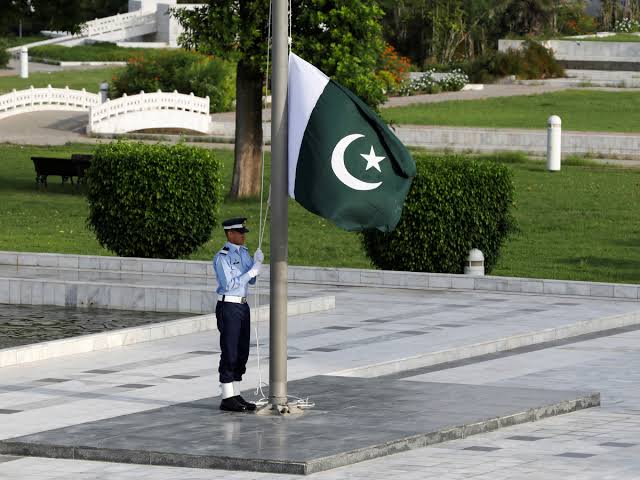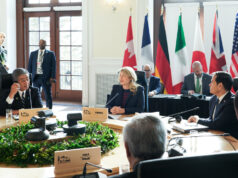Time for a new beginning for Pakistan

Ahmed Bilal Mehboob
FORMER prime minister Imran Khan may have his own reasons to lash out at the ‘establishment’, but the fact is that the subject of civil-military relations has been around for a long time. However, it has never been discussed so openly in Pakistan as the PTI chairman has done recently.
The candour and bitterness of his narrative has continued to intensify with each rally and media appearance. While he has indirectly complained about a number of issues over the past five months, he has specifically criticised the establishment for making him accept the name of the present chief election commissioner for appointment to that post by giving personal assurances.
He also acknowledged the use of agencies in nudging his parliamentary allies to vote for certain bills and the annual budget in the National Assembly — although it is difficult to decide whether this phenomenon reflected more poorly on Mr Khan, his former allies or the agencies.
A similar stir was created when another former prime minister, Nawaz Sharif, spoke publicly on the subject about two years ago and shocked everyone, including his allies in the Pakistan Democratic Movement, by not only strongly criticising but also naming names within the establishment.
Imran Khan and Nawaz Sharif are not the only prime ministers who have publicly expressed dissatisfaction about relations with the establishment. Former prime minister Yousuf Raza Gilani’s “There can be no state within the state” speech in the National Assembly in 2011 was an expression of extreme exasperation in his dealings with the establishment.
Even prime minister Muhammad Khan Junejo who was handpicked by Gen Ziaul Haq developed differences with him to a point that he was sacked by the general. In addition to what might have transpired behind closed doors or in confidential communications, the military has also publicly criticised the government of the day on several occasions.
During the ‘Dawn Leaks’ saga in 2017, the DG ISPR’s infamous tweet saying “rejected” to a notification of the Prime Minister’s Office may be cited as a low-water mark although, thankfully, the tweet was ‘withdrawn’ about 10 days later.
There is a need to discuss in a strategic manner all the issues affecting civil-military ties.
Although mainstream media has generally been circumspect about public expressions of these differences, social media content on the subject has grown manifold, not only in terms of volume but in its intensity and, in some cases, ugliness too.
The occasional but regularly repeated schism between the elected national leadership and the establishment is no more a topic of drawing room discussions. It is out there in the open, with people taking and expressing strong positions, sometimes even being critical of the establishment.
If opinions critical of the establishment in reference to civil-military relations resonate today, it is because so much has happened, and has been said and written on the subject during the past 70 years or so. Imran Khan may just be capitalising on the feeling that was already prevalent in the public.
The military coups/ takeovers of 1958, 1969, 1977, 1999, and the so-called emergency of 2007, and some disastrous decisions such as the Kargil war, contributed to the rise of adverse opinions among the public.
Retired Lt Gen Hameed Gul, former DG ISI, publicly admitted that he and his organisation were instrumental in creating the IJI alliance to defeat, or at least blunt the possible victory of, Benazir Bhutto in the 1988 election. Then there was the affidavit submitted by retired Lt Gen Asad Durrani, another former DG ISI, about the organisation’s involvement in disbursing funds among certain favoured politicians in the 1990 election, allegedly on the directions of the then COAS, Gen Aslam Beg.
The continued baggage of the past and the current state of civil-military relations is creating serious divisions within almost all segments of society, including those which are too sensitive to be exposed to any such divisions. Pakistan also can’t afford to weaken its armed forces. Although the tension has hurt the country for a good chunk of its history, sadly there has been hardly any tangible effort to resolve it in a strategic manner. Even now, most of the discussion is about how Imran Khan can be persuaded or pressurised to stop raising the issue in public.
There is a real need to discuss all the issues affecting civil-military relations in a strategic and dispassionate manner considering both sides’ views and with the Constitution as the basis of the dialogue. Fortunately, Pakistan has the institutional infrastructure in the form of the National Security Committee to start discussing the subject. As a first step, the civil and military leadership represented in the NSC should be willing and prepared to initiate a series of interactions on the subject.
The committee, in due time, may extend a special invitation to some opposition leaders like Imran Khan also to take part in some of the sittings to enhance the effectiveness of the engagement. One should be under no illusion that these problems can be resolved in one or a few sittings. The objective may require hard work, especially on the part of the NSC Secretariat and continuous engagement of members extending possibly over several months.
The perceived or real encroachment of the establishment on decision-making regarding key national matters, the weaknesses of the civilian side which prompt such encroachment and the short- and long-term effects of these encroachments on the state, may be the key items on the agenda of such a strategic dialogue. Perceived ‘interference’ in political and electoral matters may also need to be discussed.
The objective of the engagement should be that both the political leadership and the establishment end up strictly abiding by the roles demarcated for them in the Constitution.
With the next general election due within a year and a new military leadership about to take charge, this may be the right time to start conceptualising and preparing to address issues relating to civil-military relations like a mature society.




